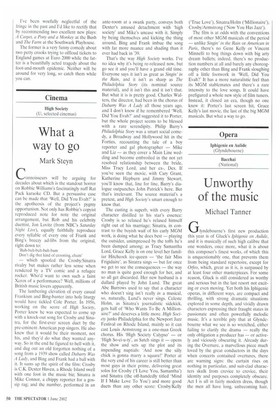Cinema
High Society (U, selected cinemas)
What a way to go
Mark Steyn
Connoisseurs will be arguing for decades about which is the standout horror on Robbie Williams's fascinatingly naff Rat Pack karaoke CD. But a persuasive case can be made that 'Well, Did You Evah?' is the apotheosis of the project's pygmy opportunism. Not only has Robbie's copyist reproduced note for note the original arrangement, but Rob and his celebrity duettist, Jon Lovitz (from NBC's Saturday Night Live), equally faithfully reproduce every syllable of every one of Frank and Bing's breezy ad-libs from the original, right down to:
`Buh-huh-buh-buh-bum Don't dig that kind of crooning, chum'
— which spoofed the Crosby/Sinatra rivalry but makes rather less sense when rendered by a TV comic and a refugee rocker. Who'd want to own such a faint Xerox of a performance? Well, millions of British music lovers apparently.
The lumbering elevation of every casual Frankism and Bing-banter into holy liturgy would have tickled Cole Porter. In 1956, working on the score of High Society, Porter knew he was expected to come up with a knock-out song for Crosby and Sinatra, for the first-ever screen duet by the pre-eminent American pop singers. He also knew that it would be their moment, not his, and they'd do what they wanted anyway. So in the end he figured to hell with it, and dug out an old forgotten nothing of a song from a 1939 show called Dubany Was A Lady, and Bing and Frank had a ball with it. It sums up the spirit of the film: Crosby is C.K. Dexter Haven, a Rhode Island swell with one foot in the music biz; Sinatra is Mike Connor, a chippy reporter for a gossip rag; and the number, performed in an ante-room at a swank party, conveys both Dexter's amused detachment with 'high society' and Mike's unease with it. Simply by being themselves and kicking the thing around, Bing and Frank imbue the song with far more nuance and shading than it ever had back in '39.
That's the way High Society works. I've no idea why it's being re-released now, but go see it and you'll have a grand old time. Everyone says it isn't as great as Singin' in the Rain, and it isn't as sharp as The Philadelphia Story (its nominal source material), and it isn't this and it isn't that. But what it is is pretty good. Charles Walters, the director, had been in the chorus of Dubany Was A Lady all those years ago, and I don't know if he remembered 'Well, Did You Evah?' and suggested it to Porter, but the whole project seems to be blessed with a rare serendipity. Philip Barry's Philadelphia Story was a smart social comedy, a Broadway and Hollywood hit in the Forties, recounting the tale of a boy reporter and gal photographer — Mike and Liz — as they cover a Main Line wedding and become embroiled in the not yet resolved relationship between the bride, Miss Tracy Lord, and her ex-, Dex. If you've seen the movie, with Cary Grant, Katherine Hepburn and Jimmy Stewart, you'll know that, line for line, Barry's dialogue outpunches John Patrick's here. But that's irrelevant. The source material's a pretext, and High Society's smart enough to know that.
The casting is superb, with every Barry character distilled to his star's essence: Crosby is so relaxed he's relaxed himself right out of his marriage; Sinatra, in contrast to the boyish waif of his early MGM work, is doing what he does best — playing the outsider, unimpressed by the toffs he's been dumped among; as Tracy Samantha Lord, Grace Kelly is on one level her familiar Hitchcock ice-queen — 'the fair Miss Frigidaire', as Sinatra sings — but for once we get to see the consequences — the way no man is quite good enough for her, and so all get discarded. Her new husband is a dullard played by John Lund. The great Abe Burrows used to say that a character who doesn't sing isn't really in a musical, so, naturally, Lund's never sings. Celeste Holm, as Sinatra's journalistic sidekick, gets half of 'Who Wants To Be A Millionaire?' and deserves a little more. High Society junks Philadelphia for the Newport Jazz Festival on Rhode Island, mainly so it can cast Louis Armstrong as a one-man Greek chorus. His 'High Society Calypso' — or 'High So-ci-u-ty', as Satch sings it — opens the show and sets up the plot and its impending nuptials: 'And now the silly chick is gonna marry a square!' Porter at the very end of his career is still better than most guys in their prime, delivering great solos for Crosby CI Love You, Samantha') and Sinatra (the off-handedly titled 'Mind If I Make Love To You') and more good duets than any other score: Crosby/Kelly
(`True Love'). Sinatra/Holm (`Millionaire'), Crosby/Armstrong (`Now You Has Jazz.).
The film is at odds with the conventions of most other MGM musicals of the period — unlike Singin' in the Rain or American in Paris, there's no Gene Kelly or Vincent Minnelli to bog things down with big arty dream ballets; indeed, there's no production numbers at all and barely any choreography other than Bing and Frank sloughing off a little footwork in 'Well, Did You Evah?' It has a more naturalistic feel than its MGM stablemates and there's a rare intensity to the love songs. It could have prefigured a whole new style of film tuners. Instead, it closed an era, though no one knew it: Porter's last screen hit, Grace Kelly's last movie, the last of the big MGM musicals. But what a way to go.






































































 Previous page
Previous page